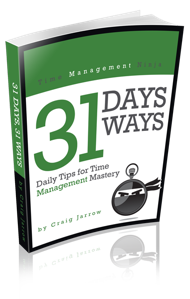
The wisdom of investing your time, versus spending it, has been well established. You want to do that as much as possible because your investments–e.g., relationships, self-care, education, and a passionate vocation or hobby—yield a profound return in terms of productivity and happiness. Expenses, in contrast, yield no such return and often subtract from your health and happiness.
However, the division between investments and expenses isn’t always clear. Here are four principles that will help you live as much as possible in the investment realm…
1) If You Truly Enjoy Doing Something It’s Probably an Investment
Most investments are complex, engaging, interesting, and enjoyable.
Most expenses, on the other hand, aren’t. Generally speaking, if you don’t enjoy doing something—if you’re just doing it because you have to (for instance, a non-mission day job); or to “kill time” (television); or because it’s conventional (housework); or because you’re afraid of being criticized if you don’t do it (committee work you don’t really care about, or a visit to unpleasant relatives, or, yeah, housework)—then it’s probably an expense, and you should work to minimize the time you devote to it.
This means, of course, that one person’s investment can be another’s expense. Cooking is an investment for those who revel in its creative and sensual aspects. However, for those (like me!) who don’t, cooking is a chore and, therefore, an expense that should be minimized.
2) Replace Escapist Activities with Replenishing Recreation
There are important differences between what I call “replenishing” and “escapist” recreation.
Replenishing recreation includes activities such as socializing, sports, arts, crafts, and outdoor activities like hiking or gardening. These activities are typically active and engaging; and they also typically connect you with others, with nature, or with your senses, intellect, or other capacities. They leave you mentally and physically healthy, as well as happy and fulfilled.
Replenishing recreation is an investment, and you should do plenty of it. Escapist recreation such as television, Web surfing, and videogaming, in contrast, tends to leave you bored and depleted. It also tends to be passive and solitary, and to leave you disconnected, disengaged, unhealthy, and unfulfilled.
Escapist recreation is a clear expense, so you want to minimize it. However, because we all need down time, it’s perfectly fine to schedule some escapism in. (When I help people with their time budgets, we generally begin with an hour of it a day, although that could increase or decrease in the final budget.) As you live more and more in the realm of your investments, however, television and other escapism become revealed for what they are – weak tea – and become easier to give up.
3) Help Others Strategically
The challenge with this category is that there’s basically an infinite need for help, both in the world as a whole and in our individual circles. Here are some guidelines for making sure that you don’t, in your desire to be a good person, derail your mission:
a) In a true emergency where someone’s health and well being depend critically on your participation, HELP. Even if you’re on the fence, in such a situation, you should probably help at least a little.
b) In non-emergencies, try as much as possible to help others only with their investments, and only when you can do so using your high-value activities, those which: (1) are congruent with your mission; (2) leverage your strengths; and (3) are impactful, i.e. they create change in the real world. This ensures you make a meaningful contribution, and is especially important since most of the people around you probably aren’t good time managers, and will therefore often ask for help with their expenses, not investments!
4) When You Don’t Feeling Like Doing An Investment, Slow Down
Most time investments, as noted above, are fun—but, let’s face it, some aren’t. Examples of investments some people dislike include personal finance, and health and fitness. A common “solution,” in such cases, is to procrastinate like mad, and then rush to finish the task. This not only feels bad, it will probably yield a suboptimal result. Instead, try this:
(a) Work to overcome your perfectionism around the task. This will help you set more reasonable goals, and alleviate any fear and ambivalence you might be feeling.
(b) Slow down and go deeper into the details. This might cause the task to magically transform into an interesting intellectual challenge!
(c) Reframe it as empowerment (which all investments really are); and
(d) Do it in community. Delegate what you can, and enlist a spouse, friend, or colleague to support you in doing the rest.
Even the least enjoyable investments, such as dealing with a chronic health problem, become much more palatable with these steps.
It takes some work to live your life more in the investment realm, but it is totally worth it! Take it in small steps, and enjoy the successes as they come.
Question: What changes can you make to start investing and stop spending your time?
 I am the author of Time Management Ninja and help individuals and companies reclaim their time to be more productive. As well, I am the author of the book
I am the author of Time Management Ninja and help individuals and companies reclaim their time to be more productive. As well, I am the author of the book 

Hi Hilary.
I really like the concept of spending your time versus investing your time. Clearly we should be investing our time 🙂
I also like how you apply this concept to the act of helping others. Who wants to help people who are just sucking your time and not improving their own methodologies?
Thinking about coaching others, where’s the satisfaction in helping someone else when they are not learning how to do things better for themselves? (Even if you are getting paid. We need to teach them to fish for themselves, etc…)
Anyway, a nice concept for helping time management which I haven’t really seen presented before in this way.
Thanks 🙂
Malc
Great post! Like Malcolm, I love the idea of differentiating between time expended and time invested.
This is a concept that’s near and dear to me, it’s so important to make choices around our time wisely. I think your article makes a succinct argument for shifting our thinking about “spending” time compared to investing it. I will be referring people to it in the future!
I love the idea of differentiating between time expended and time invested. I think your article makes a succinct argument for shifting our thinking about Private equity software “spending” time compared to investing it. a nice concept for helping time management which I haven’t really seen presented before in this way.
Great article for sure ! I haven’t really seen presented before in this way. Wiki